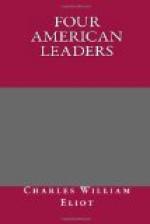Again, Washington, as I have already indicated, was an economical person, careful about little expenditures as well as great, averse to borrowing money, and utterly impatient of waste. If a slave were hopelessly ill, he did not call a doctor, because it would be a useless expenditure. He insisted that the sewing woman, Carolina, who had only made five shirts in a week, not being sick, should make nine. He entered in his account “thread and needle, one penny,” and used said thread and needle himself. All this closeness and contempt for shiftlessness and prodigality were perfectly consistent with a large and hospitable way of living; for during many years of his life he kept open house at Mt. Vernon. This frugal and prudent man knew exactly what it meant to devote his “life and fortune to the cause we are engaged in, if needful,” as he wrote in 1774. This was not an exaggerated or emotional phrase. It was moderate, but it meant business. He risked his whole fortune. What he lost through his service in the Revolutionary War is clearly stated in a letter written from Mt. Vernon in 1784: “I made no money from my estate during the nine years I was absent from it, and brought none home with me. Those who owed me, for the most part, took advantage of the depreciation, and paid me off with sixpence in the pound. Those to whom I was indebted, I have yet to pay, without other means, if they will wait, than selling part of my estate, or distressing those who were too honest to take advantage of the tender laws to quit scores with me.” Should we not all be glad if to-day a hundred or two multi-millionaires could give such an account as that of their losses incurred in the public service, even if they had not, like Washington, risked their lives as well? In our times we have come to think that a rich man should not be frugal or economical, but rather wasteful or extravagant. We have even been asked to believe that a cheap coat makes a cheap man. If there were a fixed relation between a man’s character and the price of his clothes, what improvement we should have seen in the national character since 1893! At Harvard University, twelve hundred students take three meals a day in the great dining-room of Memorial Hall, and manage the business themselves through an elected President and Board of Directors. These officers proscribe stews, apparently because it is a form in which cheap meat may be offered them, neglecting the more important fact that the stew is the most nutritious and digestible form in which meats can be eaten. Mr. Edward Atkinson, the economist, invented an oven in which various kinds of foods may be cheaply and well prepared with a minimum of attention to the process. The workingmen, among whom he attempted to introduce it, took no interest in it whatever, because it was recommended to them as a cheap way of preparing inexpensive though excellent foods. This modern temper affords a most striking contrast to the practices and sentiments of Washington, sentiments and practices which underlay his whole public life as well as his private life.




